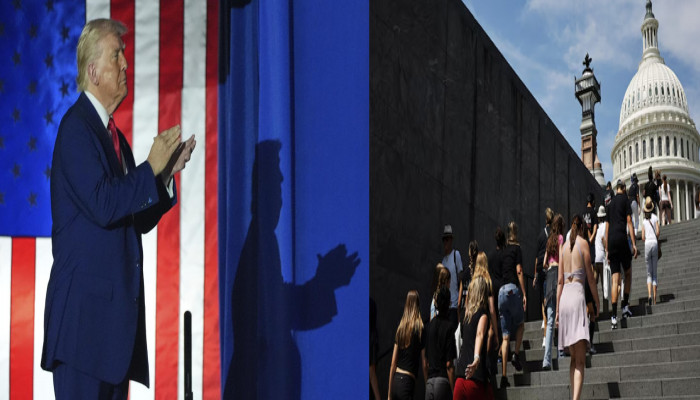US designates Haitian gangs as terrorist groups, raising concerns over humanitarian aid
- In Reports
- 11:47 AM, May 03, 2025
- Myind Staff
On Friday, the United States officially labelled a powerful gang alliance in Haiti as a foreign terrorist organisation, raising worries that this decision could worsen the country's ongoing humanitarian crisis.
The gang coalition, called Viv Ansanm—which means "Living Together"—has now been added to a list that includes eight other criminal groups from Latin America. Also added to the list is Gran Grif, the largest gang operating in Haiti's central Artibonite region, according to a report by The Associated Press on Tuesday. "The age of impunity for those supporting violence in Haiti is over," US Secretary of State Marco Rubio said in a statement Friday.
The U.S. Department of State warned that anyone—including American citizens—who does business or interacts with certain groups or individuals in Haiti could face sanctions. But for aid organisations and others working in Haiti, it’s nearly impossible to avoid contact with gangs.
A gang alliance called Viv Ansanm controls about 85% of the capital city, Port-au-Prince. This means nonprofits must talk to these gangs to safely deliver food, water, and other vital supplies to the communities. "The first consequences (of the designation) will be on the humanitarian and international cooperation, which is basically the only thing preventing the people in Haiti from starving," said Romain Le Cour, with Global Initiative Against Transnational Organised Crime.
Haiti is going through its worst hunger crisis ever. Over half of the country’s 12 million people are expected to face serious hunger by June, and about 8,400 people living in temporary shelters could die from starvation. This situation may also hurt businesses operating in Haiti. Armed gangs control areas near key fuel supplies, the main port, and important roads in and out of the capital. They demand payments, or "tolls," from anyone passing through.
Jake Johnston, a researcher at the Center for Economic and Policy Research, said the current conditions are so severe that it could feel like an economic blockade, even if no official embargo is in place. The gangs in Haiti have a lot of control over the country's business sector, making it much riskier to engage in any form of trade with or within Haiti. Gang violence has been rapidly increasing, with over 1,600 deaths and 580 injuries reported between January and March.
Additionally, more than a million people have been displaced due to the violence. Although the gangs have suffered significant losses, with nearly 1,000 gang members killed, they are still expanding their influence, particularly in the Port-au-Prince area and nearby regions, according to a recent UN report. Viv Ansanm is leading a wave of violent attacks in Haiti. This group is a coalition of over a dozen gangs, including two rivals, G-9 and G-Pèp, who came together in September 2023.
The coalition became active again in late February 2024. Armed members attacked police stations and broke into Haiti’s two biggest prisons, freeing more than 4,000 inmates. They also shut down the country’s main international airport for nearly three months. This blocked former Prime Minister Ariel Henry from returning home after a visit to Kenya.
As the violence escalated, the government declared a state of emergency. Since Henry couldn’t return, he officially resigned in April 2024. The gang called Viv Ansanm has recently attacked once peaceful neighbourhoods on the outskirts of Haiti’s capital, killing hundreds of people. At the same time, another gang named Gran Grif has raided cities and towns in central Haiti.
In October, they were blamed for killing more than 70 people in Pont-Sond, making it the deadliest massacre in Haiti’s recent history. Gran Grif has also taken over parts of Mirebalais and is continuing to attack nearby communities. Their goal seems to be to gain control of routes leading to the Dominican Republic border, according to a UN report.
Le Cour, from the Global Initiative Against Transnational Organised Crime, said that trying to stop these gangs by just labelling them as terrorists or criminals won’t solve the problem. The recent designation intended to apply pressure may not be enough, as it fails to address the real challenges on the ground. To effectively target and arrest gang leaders in Haiti, there must be a buildup of resources and capacity for law enforcement.
The violence has already overwhelmed Haiti's National Police, and a UN-backed mission led by Kenyan police is struggling to fight the gangs due to lack of funding and resources. Even when gang members are arrested, the situation is complicated by the weak judicial system in Haiti. Many courthouses are destroyed, non-functional, or inaccessible, preventing judicial personnel and lawyers from doing their jobs. The blanket policy of the designation seems insufficient and overlooks the complexities of the current situation. Le Cour suggests that it should instead target those in the US who smuggle firearms into Haiti and the networks that supply ammunition and weapons to the country.







Comments